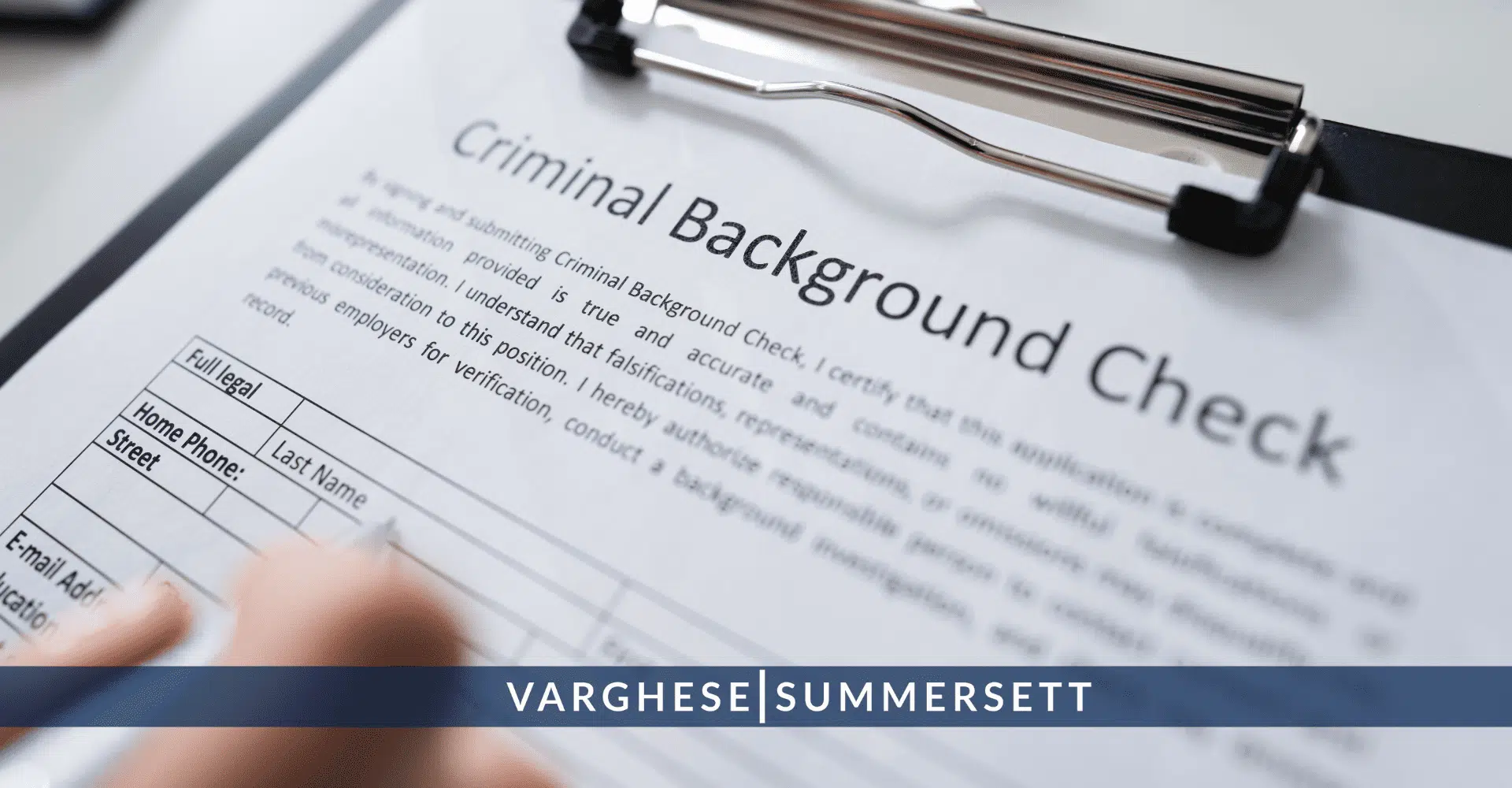Dallas Nondisclosure Lawyer | Sealing Criminal Records [2022]
Dallas Nondisclosure Lawyer Serving Dallas and Surrounding Areas
Many people who have had their criminal case dismissed are surprised when their arrest shows up on a routine background check. They wrongly assumed that their record was clear; they thought they had put the past behind them.
In Texas, the only way to truly seal a criminal record from public view is through what is known as a nondisclosure. In this article, our Dallas nondisclosure lawyer is going to discuss the nondisclosure process in Texas and how to ensure certain arrests and convictions don’t show up on a routine background check.
What is a criminal nondisclosure in Texas?
A nondisclosure is a court order that prohibits public entities, such as police departments and courts, from releasing or disclosing certain criminal records. If you receive an order of non-disclosure, your charge is sealed from public view and it will not show up on most background checks. It also allows you to legally deny your arrest in response to questions on job applications.
It’s important to point out an important caveat, however, about nondisclosures in Texas. If you receive an order for nondisclosure, certain licensing agencies – including law enforcement, education and government organizations – will still have access to the information and records. This means if you are interested in becoming a doctor, teacher, lawyer or any job licensed by the state, these boards will be able to obtain information about your case. If you have a question about whether a specific licensing will see your charge, it’s best to speak to a Dallas nondisclosure lawyer.
Board Certified Criminal Defense Attorney on Nondisclosure
Who qualifies for a nondisclosure in Dallas?
A Nondisclosure can certainly help people get on with their lives, however, not everyone is eligible for one. Prior to September 1, 2015, only individuals who had their cases dismissed after completing deferred adjudication probation were eligible for a nondisclosure
Fortunately, significant changes to nondisclosure laws have gone into effect over the past several years, which expanded eligibility for people seeking to seal their criminal record through a nondisclosure.
Under Texas Government Code, Chapter 411, you may qualify for a nondisclosure if:
- you successfully completed deferred adjudication for certain nonviolent misdemeanors AFTER September 1, 2017, and it has been at least 180 days since your plea – Section 411.072. This is sometimes referred to as an automatic nondisclosure because the law states that the judge “shall” grant the order of nondisclosure UNLESS the judge finds it would not be in the best interest of justice;
- you successfully completed deferred adjudication for certain felonies or misdemeanors and obtained a dismissal – Section 411.0725. This is the most common application for nondisclosure;
- you received a dismissal after completing deferred adjudication for a qualifying DWI or BWI (Boating While Intoxicated) – Section 411.0726;
- you successfully completed a veteran’s court treatment program – Section 411.0727;
- you are a sex trafficking victim and your prostitution conviction or related offense was set aside (judicial clemency) – Section 411.0728;
- you completed a veteran’s reemployment program – Section 411.0729;
- you successfully completed straight probation for certain misdemeanors and have never previously been convicted or placed on deferred adjudication for any offense – Section 411.073;
- you successfully completed DWI probation for a first-time offense– Section 411.0731
- you served jail time for certain non-violent, non-sexual misdemeanors after Sept 1, 2015 – Section 411.0735;
- you served a misdemeanor DWI jail sentence for a first-time offense – Section 411.0736.
As you can see, it can be complicated to determine if you are eligible for a nondisclosure in Dallas. To find out for certain, contact our law firm and speak to an experienced Dallas nondisclosure lawyer. We will review your case and determine if you meet the criteria to have your records sealed from public view.

What offenses are not eligible for nondisclosure?
You are ineligible for an order of nondisclosure if you have ever been convicted of or placed on deferred adjudication probation for any of the following:
- Capital murder
- Murder
- Aggravated kidnapping
- Trafficking of a person
- Continuous trafficking of a person
- Injury to a child, elderly individual or disabled individual
- Child endangerment or abandonment
- Violation of a court order or conditions of bond in a family violence, sexual assault or abuse, stalking or trafficking case
- Repeated violation of certain court orders or conditions of bond in family violence, sexual assault or abuse, stalking or trafficking case
- Stalking
- Certain domestic violence offenses
- Any offense requiring you to register as a sex offender
Can I receive a non-disclosure for a DWI in Dallas County?
Yes, as long as it’s your first DWI and other criteria are met. In 2017, the so-called “Second Chance Law’ was passed, allowing for a nondisclosure of a first time DWI under certain circumstances. Before this law was passed, a DWI could not be sealed. To be eligible for a DWI nondisclosure:
- It must be your first misdemeanor DWI;
- Your BAC cannot be .15 or higher;
- The offense didn’t involve an accident with another person (including your own passenger);
- You must not have any other prior convictions, other than this DWI, for anything other than a traffic offense;
- You must have successfully completed probation for the DWI offense and paid all fines, costs and restitution OR received a jail sentence and paid all fines, costs and restitution;
- You cannot have been placed on deferred adjudication for certain violent crimes or any crime requiring sex offender registration. Prior traffic offense punishable by fine-only are not considered;
It’s important to point out that a nondisclosure will only be granted if the judge determines it is the best interest of justice. Also, you cannot get a DWI non-disclosed in Dallas if you have ever previously been convicted of or placed on deferred adjudication for any other charge, other than a Class C traffic ticket.
How do I go about obtaining a nondisclosure in Dallas?
To obtain a nondisclosure, it’s best to contact an experienced nondisclosure lawyer in Dallas. After verifying that you are eligible for a nondisclosure, the attorney will prepare a petition for nondisclosure and file it with the proper court in Dallas County. The state then has an opportunity to request a hearing or the court can set one on its own. At the hearing, the court will determine if granting the nondisclosure is in the best interest of justice, and if so, the judge will grant an order prohibiting the disclosure of your criminal record. You may or may not have to attend the hearing. It’s also possible for the judge to waive the hearing if both sides agree, meaning no one objects to the nondisclosure. You attorney will advise you on the logistics of your nondisclosure petition.
Is there a waiting period for a Dallas non-disclosure?
For many misdemeanors, you can file for a nondisclosure immediately after completing deferred adjudication probation. However, for some misdemeanors, you must wait two years after the date of discharge before seeking a petition for a nondisclosure. For felonies, you must wait five years from the date of discharge before filing a petition for nondisclosure. An experienced Dallas nondisclosure attorney can determine whether there is a waiting period for your charge and determine your eligibility date.
What’s the difference between a nondisclosure and an expunction?
A nondisclosure and an expunction are both are mechanisms to clear your criminal record. An expunction is the most desirable of the two because it permanently destroys your record. It is as if it never happened. It is also harder for which to qualify. A nondisclosure seals, or hides, certain offense from public view, but they are still visible to licensing agencies, law enforcement and certain government entities.
Dallas Nondisclosure Lawyer: What’s the Difference between an Expunction and Nondisclosure
How long does it take to get a nondisclosure in Dallas?
Generally, it takes several months to get an order of nondisclosure in Dallas. After we review your case for eligibility, we will prepare the petition for nondisclosure. Once the petition is filed, the state will have an opportunity to respond. This generally takes two to six weeks. If the state does not object, the parties may come up with an agreed order. The matter then gets set on the court’s docket. Again, that may take weeks or months, depending on the efficiency of the court. The court could require a hearing, or if there’s an agreement, the judge might waive the hearing. Once the order is signed by the court, the process is only halfway done. Our Dallas nondisclosure attorney then sends the order of non-disclosure to every entity we believe has your information. They then go through the process of taking down the information from the public view. Texas DPS – the primary supplier of background information in Texas – is about several months behind on complying with orders – and that’s before the pandemic. As a result, it could take many months for the order to be complied with and your information to come down.
What if my criminal information is still showing up on background checks?
If your criminal record can still be seen six months after receiving an order of nondisclosure, our law firm will send a copy of the nondisclosure order to the entity that is disclosing the information and a certified letter explaining that it’s a crime to distribute the sealed information. So far, that method has worked, but if the information did not get taken down, we would contact law enforcement.
What agencies can still receive criminal records of a Non-disclosed offense?
The following agencies have access to non-disclosed offenses in Texas:
- Law Enforcement Agencies;
- State Board of Educator Certification;
- School districts, charter schools, private schools, regional education service centers, commercial transportation companies, or education shared service arrangements;
- Texas State Board of Medical Examiners;
- Texas School for the Blind and Visually Impaired;
- Texas Board of Law Examiners;
- State Bar of Texas;
- District court regarding a petition for name change;
- Texas School for the Deaf;
- Department of Family and Protective Services;
- Texas Youth Commission;
- Department of Assistive and Rehabilitative Services;
- Department of State Health Services, a local mental health service, a local mental retardation authority, or a community center providing services to persons with mental illness or retardation;
- Texas Private Security Board;
- Municipal or volunteer fire department;
- Board of Nurse Examiners;
- Safehouse providing shelter to children in harmful situations;
- Public or nonprofit hospital or hospital district;
- Texas Juvenile Probation Commission;
- Securities commissioner, the banking commissioner, the savings and loan commissioner, or the credit union commissioner;
- Texas State Board of Public Accountancy;
- Texas Department of Licensing and Regulation;
- Health and Human Services Commission; and
- Department of Aging and Disability Services.
Want to seal your criminal record? Speak to a Dallas nondisclosure lawyer.

Having an arrest on your background can have devastating consequences. Let an experienced Dallas nondisclosure lawyer at Varghese Summersett work to seal your record. We clear clients’ arrest records in Dallas, Addison, Coppell, Carrollton, Garland, and surrounding cities. Call 214-903-4000 now for a free consultation to see if you qualify for a nondisclosure.
